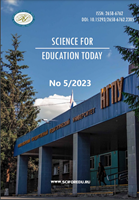Специфика повышения эффективности освоения английского языка магистрантами, специализирующимися в сфере IT
pecificity for improving the efficiency of English language acquisition by IT-Master’s students
Author(s): Nadezhda Anatolyevna Goncharova, Aleksandrina Iosifovna Khaitova, Alla Anatolyevna Oshkordina, Elena Nickolaevna MakarovaSubject(s): Foreign languages learning, Higher Education , Sociology of Education, Distance learning / e-learning
Published by: Новосибирский государственный педагогический университет
Keywords: Foreign language communicative competence; IT-Master’s students; Educational technologies; Thematic presentation; Educational needs; Learning motivation; Professional foreign language;
Summary/Abstract: Introduction. The authors study the problem of training professionals having sufficient English language proficiency in the modern conditions of globalization of scientific and technological progress and the accompanying international discourse in the field of IT. The purpose of the article is to identify specificity for improving the efficiency of English language acquisition by IT-Master’s students. Materials and Methods. The sample consisted of 94 1st -year Master’s students, majoring in IT, as well as 25 university teachers of English for Professional Purposes with more than 10 years of work experience. The results of the theoretical analysis of the problem were compared with the data obtained from the survey of 76 Master’s students, as well as with the results of a survey of 25 university teachers focusing on the issues of finding ways to improve the efficiency of English for Professional Purposes acquisition. The specific authors methodology called ‘multimedia presentation’ developed on this indicative basis was tested in the course of English for Professional Purposes in an experimental group of IT-Master’s students (n=18). At the same time, a control group of 21 Master’s students were studying standard English for Professional Purposes discipline. The results were processed by means of qualitative analysis and methods of mathematical statistics. Results. Comparison of the data from theoretical analysis and surveys made it possible to identify the criteria, conditions, factors, indicators and levels of increasing the efficiency of English for Professional Purposes acquisition, corresponding to the personal and professional characteristics of MA-students, majoring in IT. On this basis, the ‘multimedia presentation’ technique was developed and implemented in the experimental group of MA-students. A comparative analysis of the indicators of mastering English for Professional Purposes in the control and experimental groups revealed statistically significant differences in the levels of these indicators. Statistically significant data have shown that the experimental group had more master’s students who achieved high performance, whereas the control group included more postgraduates, who did not rise above the average level in their performance. As one of the possible interpretations of the data obtained, an assumption about the dominance of motives that are different in essence and formed in each group was made. As a result, in the experimental group, procedural motives could grow, creating enthusiasm for the learning process, which allowed participants to demonstrate high indicators. In the control group, only external stimuli could dominate. In the absence of significant enthusiasm for the learning process, this became a subjective justification for the MA-students’ acceptability of a satisfactory grade. Conclusions. The developed methodological tools statistically significantly increase the efficiency of English for Professional Purposes acquisition by initiating procedural motives for learning in Master’s students. The proposed trajectory of increasing the effectiveness of these processes can be considered as a tentative basis for constructing methods for teaching English for Professional Purposes to specialists, who in many respects have already developed as individuals and as professionals.
Journal: Science for Education Today
- Issue Year: 13/2023
- Issue No: 5
- Page Range: 51-77
- Page Count: 27
- Language: Russian

